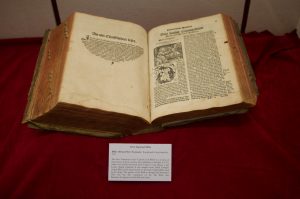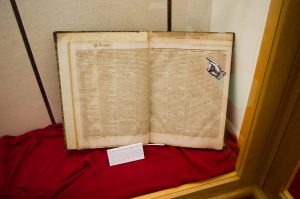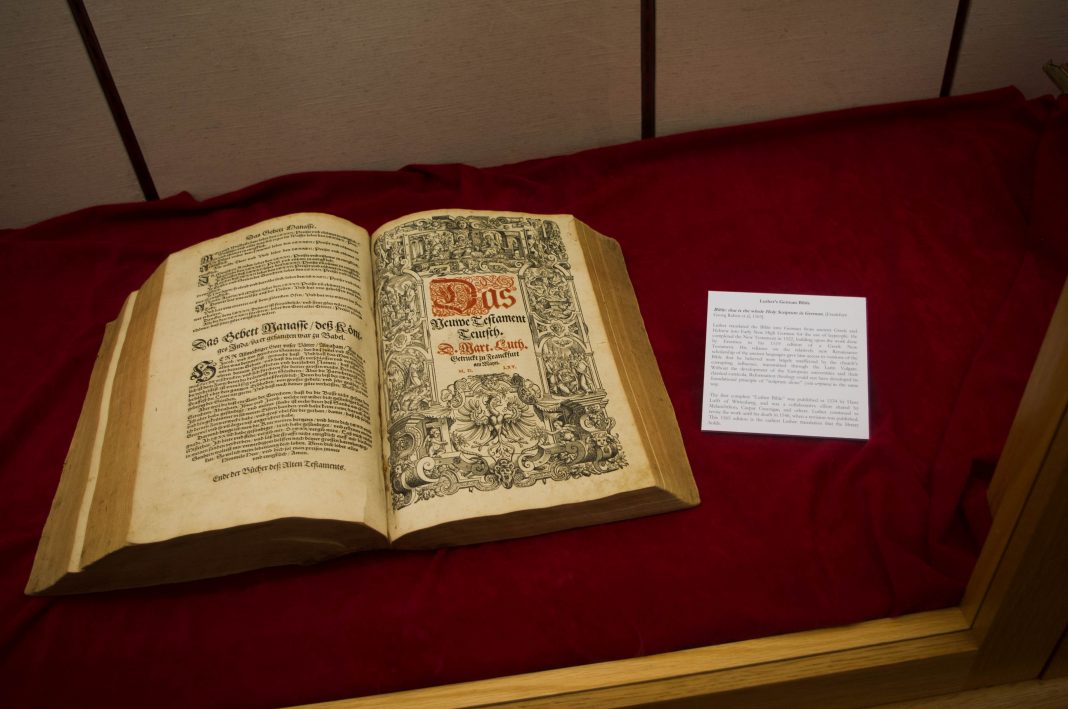Exactly 500 years ago, on a day that would later be known as Halloween, Martin Luther nailed the Ninety-five Theses to the door of All Saints’ Church, in Germany, preaching reform to the indulgent ways of the Catholic Church.
In 1742, Henry Muhlenberg, a prominent Lutheran pastor, immigrated to Pennsylvania with his family to unite the scattered believers into one organized North American Lutheran church. In 1787, Henry Muhlenberg’s son General Peter Muhlenberg, also a Lutheran pastor, was elected to be Vice-President of the Supreme Executive Council of the Commonwealth of Pennsylvania on a day that has yet to be known as Halloween.

Room as a part of the exhibit “Opening Luther’s Door,” celebrating the 500th anniversary of Lutheranism. Gregory Shanahan/The Muhlenberg Weekly
In 1848, a Lutheran seminary was formed in Allentown that was then revamped into Muhlenberg College in 1867. It was named after the famous lineage featuring Henry Muhlenberg’s great-grandson Frederick Muhlenberg as the first president.
About a week ago, on a day very much known as Halloween, Susan Falciani, the Special Collections and Rare Books Librarian here at Muhlenberg, compiled several documents from Muhlenberg’s archives and put together the exhibit “Opening Luther’s Door: Lutheran Education from Wittenberg to Allentown” in the Rare Books Exhibit Room.
In “Opening Luther’s Door,” Falciani tells the story of the development of the Lutheran philosophy and how it was incorporated into the liberal arts education we have today as a Lutheran college. The beginning of this story is told with literary artifacts like original Lutheran religious pamphlets, some from as early as 1720 and one in particular featuring what is most likely a signed address from Martin Luther himself to a supporter of his at the time.
Muhlenberg College has a long history of educating people so they can go out on their own, find their own beliefs and understand the diversity of this world.
Moving chronologically through the exhibit, the story continues with a revised copy of Luther’s original fully translated bible, the first bible to be translated from old Latin into German for the masses to read. Next to it is an original copy of Johann Eck’s competing bible translation to German, one of Luther’s main rivals from the Catholic Church, which preached anti-Lutheran ideals. The rest of the exhibit displays various documents from Muhlenberg College’s past from back when it was still a seminary all the way up to the celebration of the 200th anniversary of Henry Muhlenberg coming to America.

The main tying principle that makes us a liberal arts and Lutheran school is due to one of the core concepts that Luther had known as “vocation.” Luther believed in the importance of the idea of a vocation in religious life and for all life in general. Falciani further explains, “there’s a tradition that involves training students to find their place in the world, this idea of a vocation.”
Similarly, the liberal arts are all about us perceiving the outer world around us – to see the meaning behind other’s points of view and to understand the world in our own ways so we can thrive even in situations that are new to us.
“The Lutheran education has always been about that,” Falciani continues, “but it’s more about vocation, which is your ‘where do I fit in that?’ so it’s not just about being well rounded and able to adapt but it’s more about ‘where is my place?’ ‘what is my calling?’”
Just because we’re a Lutheran college or we practice Lutheran ideals doesn’t mean we don’t embrace other religious ideals or other points of view in general; quite the opposite in fact. Muhlenberg College has a long history of educating people so they can go out on their own, find their own beliefs and understand the diversity of this world.
The Rare Books Room will be holding open Luther’s door whenever the library is open for the next six months. Stop by sometime, read a rare book and see if you can start to find your own calling in this world.
Ethan is a freshman with an intended neuroscience major and an eye for shiny things like arts and culture. Self plug for the MCEMS training corps, science journalism club, (maybe) the MCA, and many other non-writing based nerdy clubs, but most importantly he's a proud member of the A&C writing gang.






















